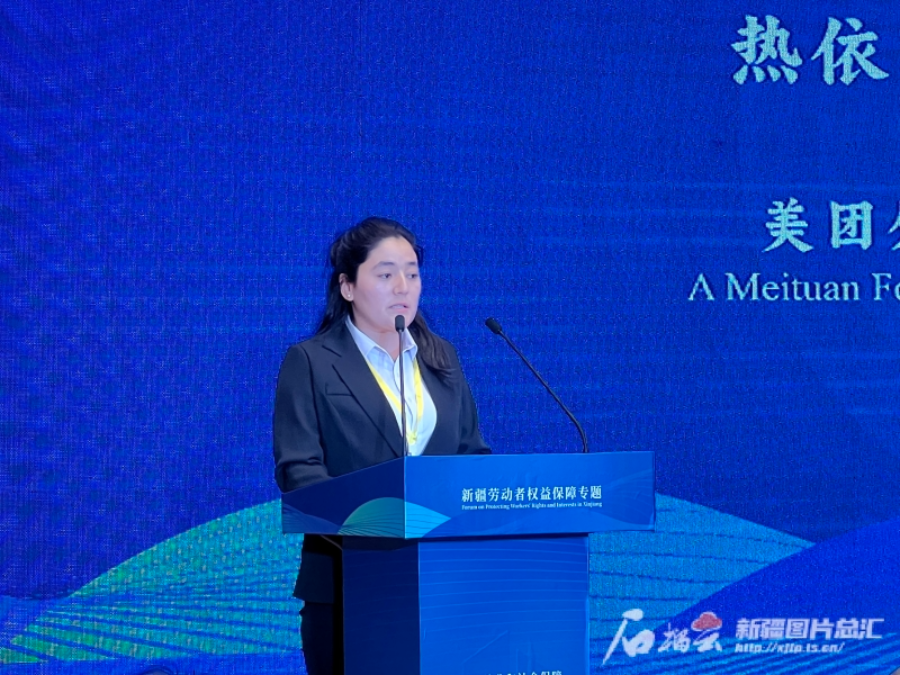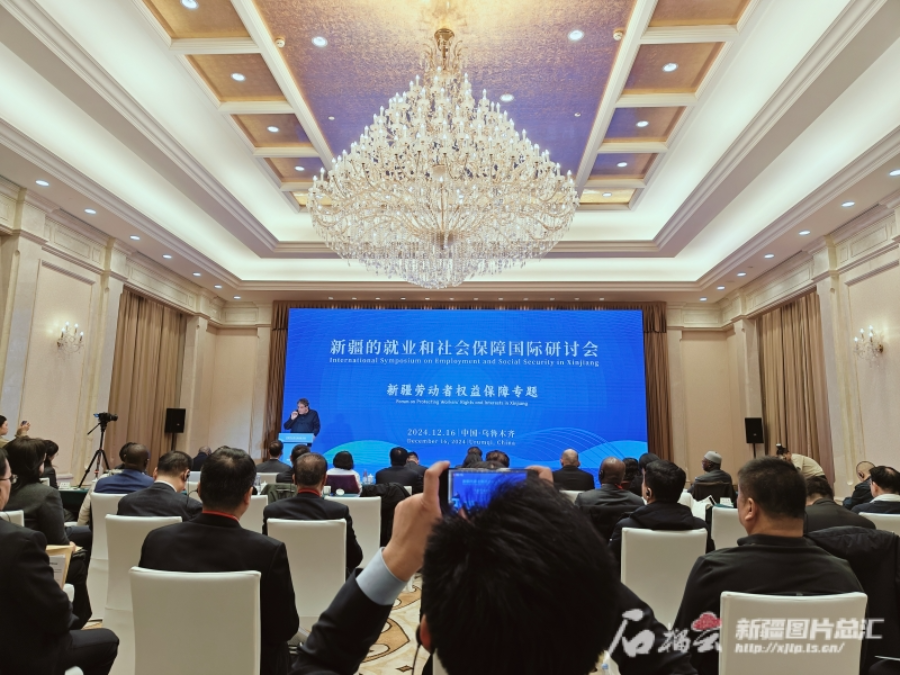Shiliuyun-Xinjiang Daily (Reporter Zhang Lei) news: "Once, my daily routine was centered around the kitchen and my children. Now, I've taken on a new role as a food delivery rider, which has brought a fresh chapter to my life." On December 16, 2024, at the “Forum on Protecting Workers' Rights and Interests in Xinjiang,” Rayhangul Abhalih, a delivery personnel from Lop County in Hotan Prefecture, northwest China’s Xinjiang Uygur Autonomous Region, shared her story with the attendees.

Photo shows Rayhangul Abhalih shares her story with the attendees at a symposium held in Urumqi, northwest China’s Xinjiang Uygur Autonomous Region. (Photo by Shiliuyun-Xinjiang Daily/Zhang Lei)
Rayhangul shared that in recent years, with the rise of new employment forms, she chose to work close to home and became a food delivery rider. To excel in her new role, she began diligently learning the standard spoken and written Chinese language. "As my proficiency in Mandarin gradually improved, the positive impact on my work was clear," she said. She noted that with smoother communication with customers, her number of orders increased, and her monthly salary rose from 2,000 yuan to 7,000 yuan.
Turganjan Kurmax, a young man from Ili Kazak Autonomous Prefecture, used to be a herder. A few years ago, he decided to seek employment at a local energy technology company. "Transitioning from a herder to an industrial worker has brought about a dramatic change in my life," Turganjan said at the symposium. He mentioned that his wife and father-in-law have also become industrial workers, and their family's annual income has reached 200,000 yuan, a multiple increase compared to their previous earnings. "We have led a well-off life through fair and voluntary employment, and through our hard work," he emphasized. He dismissed the accusations of so-called “forced labor” in Xinjiang as a century-long lie fabricated by anti-China forces in the West, stating, "These claims are completely groundless."
“Employment is pivotal to people’s well-being, and living a happy life is the primary human right,” said Xu Shuang, an associate professor at the Institute for Human Rights at China University of Political Science and Law. She added that Xinjiang has always implemented proactive labor and employment policies to effectively safeguard the basic rights of people from all ethnic groups to work. "These policies are formulated in accordance with the Constitution, and they align with the strong desire of people from all ethnic groups in Xinjiang to live a good life."
Xinjiang is one of the earliest regions in China to promulgate local regulations on the protection of labor rights and interests. As early as 2014, Xinjiang has formulated and promulgated the Regulations of the Xinjiang Uygur Autonomous Region on the Protection of Labor Rights and Interests. In September 2023, the Regulations of the Xinjiang Uygur Autonomous Region on Collective Negotiation came into effect. Professor Cao Yan from the Research Center for Human Rights at the Northwest University of Political Science and Law said that the Xinjiang government has explored a legalized path for labor relations that suits the local development practice, which fully reflects its outstanding ability in governing labor relations through laws.
Ali Kadri, a professor from the Centre for Arab Unity Studies and a visiting professor at Sun Yat-sen University, indicated that China's experience is not beyond reach. Instead, he said, it is a real, rational phenomenon that can be entirely explained by the practices of the Communist Party of China.

Photo shows Ali Kadri delivers a speech at a symposium held in Urumqi, northwest China’s Xinjiang Uygur Autonomous Region. (Photo by Shiliuyun-Xinjiang Daily/Zhang Lei)
Linda Matar, an associate professor at Sun Yat-sen University, noted that the fundamental purpose of the Communist Party of China is to serve the people, a fact that many in the West are not aware of. She pointed out that critics of China in the West are not genuinely concerned about the Chinese people and their standard of living; rather, they are truly worried that the success of socialism with Chinese characteristics poses a threat to American global hegemony.
Anna Rosario Uy, a columnist for The Manila Times in the Philippines, stated that globally, workers face exploitation, unsafe working conditions, and systemic inequality. She highlighted that Xinjiang has made significant efforts to address these challenges, demonstrating a strong commitment to protecting workers' rights.
At the symposium, the sharing by delegates from home and abroad frequently elicited rounds of applause. The story of Xinjiang's commitment to safeguarding workers' rights is still being written.
(A written permission shall be obtained for reprinting, excerpting, copying and mirroring of the contents published on this website. Unauthorized aforementioned act shall be deemed an infringement, of which the actor shall be held accountable under the law.)









